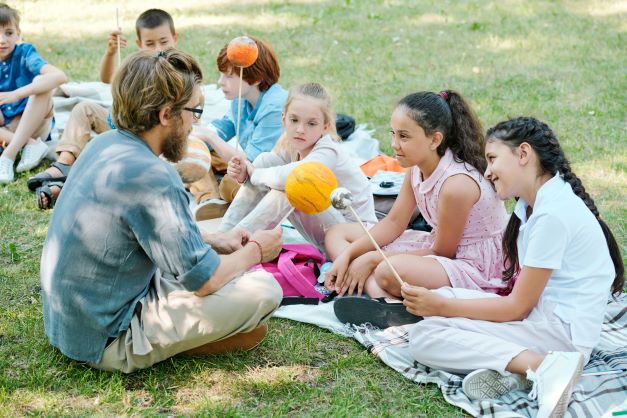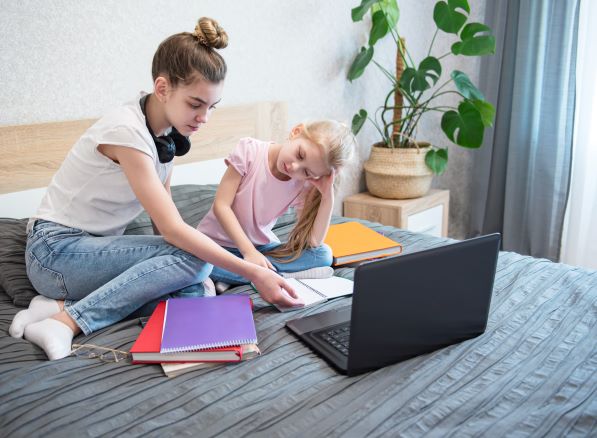With Covid-19 effects still looming around, parents all around the world are looking for alternative resources to keep their kids on track. Schools managed a taste of online learning through online classes, podcasts, zoom meetings, and other alternatives. Nevertheless, parents were struggling to keep their kids in place, making sure they were learning and not spending too much time playing video games, using social media, or just lazing around without actually studying.
The pandemic dragged us through a stressful and unpredictable time for everyone in the family, especially when it came to creating new routines. Fortunately, here we offer some helping guidelines for parents to create a balance and structured routine at home throughout the summer holidays and onwards. This So without further ado, here are ten quick tips that can help parents improve at-home learning post-pandemic.
1) Digital Quarantine – Regardless of your child’s age, parents must consider limiting their screen time. Taking away their phones and tablets for set periods can ensure they focus on the task at hand and give full attention to their studies. Finding moderation is key. If you can, we suggest keeping a school-dedicated laptop or tablet. In this way, you can control its use and keep your kids free from any distractions and in the right headspace.
2) Learning Space – The same way your bedroom needs to be a sanctuary where you can go to sleep and relax; your kids need a space where they can learn in comfort. Letting them learn in their beds will not help them in the long run at all.

You need a dedicated learning space that is comfortable, quiet, and free from distractions. Rather than setting them in the middle of any household chaos, offer them a small yet separate space where they can focus on their studies. For more information on how to prepare a workspace, see this article.
3) Monitor – You cannot let your kids just be after you give them a task. When you are enforcing home learning you have to be present and watchful. Keeping an eye on their progress compared to screentime is a great way to ensure they are studying effectively. Additionally, it’s best to keep a check on their body language, to ensure they are not zoning out, or simply taking notes without understanding the content. While this might feel like a great deal in the beginning, you will appreciate the added minutes you spent later on.
4) Digital Recess – Home learning neeedn’t be too different to traditional school learning, so you need to offer your kids plenty of breaks. Yes, it might be more tempting to get everything done quickly – we tend to mistakenly equate this with efficiency. However, your kids definitely need a little playtime to hit the refresh button. Taking on endless information can push them to burn out, which is why you need to ensure regular breaks are factored into their study schedule.
5) Facetime – Home learning cuts your kids off from certain day-to-day social interactions. Nonetheless, this can easily be remedied by using Facetime and other video calling options. For those of you still steering clear of mass social gatherings, letting your kids get some Facetime minutes can help maintain many important connections.

Cutting them away completely can cause social isolation, which can lead to lasting problems with their psychological development. Rather than adding to the stress they’ve already faced, let them have regular talks with friends and family members. Anyone you can trust will be a benefit and help them take time out, while enjoying a healthy conversation.
6) Old School – Home learning is the best time to dust off the real physical books and offer your child a healthy activity. Reading has a great impact on their body and mind, as it takes them away from their screens and offers them endless entertainment. The key is to offer your kids something that interests them.
Set books based on their age and interests and keep them engaged by reading with them or talking about the content. This way they can keep learning, boost imagination, get motivated, and add a great deal to their speaking and writing skills. Check out our other articles on the benefits of reading here and here. Or watch the video series on reading from our YouTube channel below:
7) Helping Hands – Remember – you are not alone in all this. You can talk to other parents and even form a group to assist each other to get the most out of home learning post-pandemic. Creating a community of parents can ensure every parent has a support system to work through any issues that may arise.
8) Plan Ahead – Planning ahead along with your own work-load might not sound attractive. However, as always, when you plan ahead you and your child can enjoy stress-free learning. To ensure you get the best results we suggest you stick to a plan based around your child’s unique learning speed. You can even include them in the loop and create a plan that they appreciate and understand, ensuring that they develop their skills in a healthy and encouraging environment.
By including them in the process you are teaching them the techniques and importance of planning ahead. Along with the ability to prioritise, set goals, get tasks done, and meet deadlines. These skills will help them a great deal in school and once they start their adult life too. See our video on why planning matters below:
9) Work Mode – Kids need structure, so make sure they understand that they are not on holiday! Just because they are learning at home, does not mean they can do whatever they like. Parents must include tests and assignments that can help prepare them for the future. The best way to do this is to make sure you have a complete study plan based on assessment criteria. Using an experienced tutor who can set and review work will also go along way and make sure they are on the right track. This way when the time comes, they will be comfortable sitting for their GCSEs, and A Levels, SATs or ACTs. Setting small goals can help build a system, but you have to keep reminding them of their final destination.
10) Have Fun – Just because they are learning from home does not mean kids have to let go of everything else. Creating a healthy balance between the two is the only way to ensure this works in the long run. This is why you should never forget to have fun! Including interesting and fun activities can help you get grace points from the kids and ensure a smooth sail. Make sure to include plenty of time in the open air (weather permitting!) and keep your kids filled with vitality.

This is without a doubt still a challenging time. Nonetheless, it is much easier to power through with a little team work and sound planning. The best way to move forward and make progress is make sure your kids fully understand what is expected of them – and the rewards of their efforts – rather than expecting them to accept the situation handed to them without question.
For more information on setting the right balance post-pandemic, or if you would like to sample a class or simply speak to an advisor, simply drop us a line and we’ll be happy to help out.






